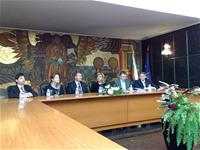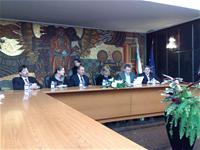The first 100 days of Rumyana Zheleva: neither a foreign minister, nor a commissioner
Adelina Marini, November 16, 2009
 For more than 2 hours the Bulgarian foreign minister Ms. Rumyana Zheleva presented a report of what has been achieved for her first 100 days on the post. The report was presented before journalists and students in political science and international relations. The focus was on the numerous meetings she and the prime minister had so far and it was underlined that this is the only government that so many meetings for such a short period of time. The result of those meetings was the "positive interest toward the changes in Bulgaria" as well as the "return of trust" in our country by the EU and NATO partners.
For more than 2 hours the Bulgarian foreign minister Ms. Rumyana Zheleva presented a report of what has been achieved for her first 100 days on the post. The report was presented before journalists and students in political science and international relations. The focus was on the numerous meetings she and the prime minister had so far and it was underlined that this is the only government that so many meetings for such a short period of time. The result of those meetings was the "positive interest toward the changes in Bulgaria" as well as the "return of trust" in our country by the EU and NATO partners.
Ms. Zheleva also paid attention to the fact that in the very beginning of her work as a foreign minister Bulgaria has been put in the centre of European politics as this was one of the priorities of the Ministry of Foreign Affairs. To prove this the first diplomat recalled the unblocking of frozen EU funds on several programmes: on PHARE - 56 mn lv (28.71 mn euro); on SAPARD - 67 mn lv (34.35 mn euro); ISPA - 113 mn lv (57.94 mn euro); on the operational programmes - 130 mn lv (66.6 mn euro) and 1 mn lv on Schengen (0.51 mn euro). And all this happened during 31st of July and 30th of October. But this proof does not explain how exactly this is putting Bulgaria in the centre of European politics.
The Ministry reported as another success the prevention of the extension of the mechanism for cooperation and verification not only over justice and home affairs but to cover the EU funds and Schengen as well. According to Ms. Zheleva "with this problem my career in the Ministry has started". A short while before the Commission published its annual report on the mechanism, there was a threat, later denied by the Swedish Presidency, that the mechanism might be extended further to cover the EU funds and Schengen. In the document, published on the 22nd of July, such a text was not mentioned even as a threat.
In September the European Council approved the reports of the Commission on the mechanism for Bulgaria and Romania. But before that there was fear that the Netherlands, Germany, Finland and several other EU member states might require the mechanism to be extended. However, the final conclusions of the Council the text was not included. According to the Bulgarian government, this was a result of the intensive efforts of the cabinet.
For a little more than 3 months as a foreign minister Rumyana Zheleva reported the quick and adequate reaction on 2 incidents with Bulgarians abroad. Those are the sinking of the "Ilinden" ship  in the Ohrid lake in Macedonia when 15 Bulgarians died and the case with the Bulgarian citizen Spaska Mitrova, imprisoned in Macedonia for not providing her ex husband with a bed in her home when he visited their child. The Ministry said that it also had an adequate reaction during an operation of the Moscow police in a Bulgarian building with a controversial status - neither a diplomatic status, nor other. Because of such cases the previous management of the Ministry has decided to create a Crisis Management Centre which had to react immediately without the need of a sanction from the minister or another high representative.
in the Ohrid lake in Macedonia when 15 Bulgarians died and the case with the Bulgarian citizen Spaska Mitrova, imprisoned in Macedonia for not providing her ex husband with a bed in her home when he visited their child. The Ministry said that it also had an adequate reaction during an operation of the Moscow police in a Bulgarian building with a controversial status - neither a diplomatic status, nor other. Because of such cases the previous management of the Ministry has decided to create a Crisis Management Centre which had to react immediately without the need of a sanction from the minister or another high representative.
When reporting the achievements of his team, the former foreign minister Mr. Ivaylo Kalfin said that the centre will start work in September. The new minister Ms. Rumyana Zheleva explained that the concept of the centre was ready. "We need to figure out how can we support its work in terms of resources because, given the restricted budget of the Ministry for Foreign Affairs, we have to see when it can start operating. With the new structural statute book of the Ministry we will rely on the opportunity to include the centre in the new structure". The new statute book will be ready by the end of the week, the Bulgarian first diplomat added.
And regarding her, already official, nomination for the Bulgarian commissioner, Ms. Zheleva explained that she would not become a commissioner at any cost. She said that the most appropriate fields for the Bulgarian commissioner are related to the external relations. Asked by euinside how did she imagine Bulgaria to take the Enlargement given the fact that the candidate countries are from the Balkans where there are so many unsolved problems and also given the fact that Bulgaria has not proved as a very good EU member, especially if we take into account who were the Enlargement commissioners during the accession process of Bulgaria - the German Guenter Verheugen and the Finnish Olli Rehn, how can Bulgaria be respectful and persuasive with Turkey, Croatia and Macedonia?
Rumyana Zheleva responded by saying: "In the Commission I was told that the things Bulgaria cannot get are much more if we consider the poor record of Bulgaria in quite a lot of fields. We had the largest amount of frozen EU funds. If we follow the same logic, Bulgaria will never be able to get a field where the country will be responsible for even 1 euro. I know that Bulgaria will not get Regional policy, which is my bitter regret. I know that other East European countries are potential nominees but they have a lot to show. I look at the distribution of the fields with great attention, this is a responsibility which the president of the Commission should take, in spite of what we want or not".
In general, Ms. Zheleva preferred Enlargement and the Neighbourhood policy. There are fields which are not appropriate for Bulgaria but "we are not omnivorous" and that is why we would reject everything that is not good for Bulgaria, Rumyana Zheleva added.
For now, the work on the restructuring or the modernisation of the Bulgarian diplomatic missions abroad will be delayed because of the formation of the new European External Relations Service, according to the Lisbon Treaty. The new service will have a diplomatic status which means that its can represent the EU as a whole by saving our country additional efforts and money to support our own mission. It is expected the new service to start functioning in the Spring of 2010.
 A main priority of the Ministry of Foreign Affairs remains the solution of the problems related to the Bulgarian properties abroad. A working group has already been established to consider the problem cases by case. The Ministry is also preparing changes in the Diplomatic Service Legislation, especially in the part related to the political appointments. In the initial version of the legislation 2 years ago it was written that 10% of all appointments of diplomats might be political, meaning people that have no diplomatic background. But when the draft was voted in Parliament the percentage was increased to 20%. According to the chief of the political cabinet of the foreign minister Dimitar Kyumyurdzhiev, a "political appointment" has no legal base and this is the least of things that need to be changed in the legislation.
A main priority of the Ministry of Foreign Affairs remains the solution of the problems related to the Bulgarian properties abroad. A working group has already been established to consider the problem cases by case. The Ministry is also preparing changes in the Diplomatic Service Legislation, especially in the part related to the political appointments. In the initial version of the legislation 2 years ago it was written that 10% of all appointments of diplomats might be political, meaning people that have no diplomatic background. But when the draft was voted in Parliament the percentage was increased to 20%. According to the chief of the political cabinet of the foreign minister Dimitar Kyumyurdzhiev, a "political appointment" has no legal base and this is the least of things that need to be changed in the legislation.
In the end Rumyana Zheleva assured that there will be no shakings in case of a change of the foreign minister if she would become a commissioner. She wished to be as forthcoming as possible and said that her decision to become a foreign minister was a result of her enormous responsibility to the political power (the ruling party GERB). Ms Zheleva recalled the sacrifice she made by giving up the quiet job of a member of the European Parliament and of a deputy chairman of the parliamentary group of the EPP - one of 9 deputies just to become a foreign minister in the new government.